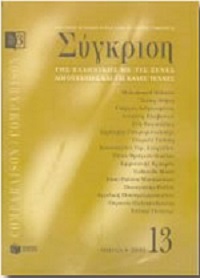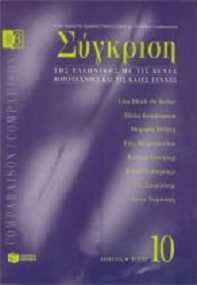The translation of Iphigenia of J.W.Goethe by Ioannis Papadopoulos (Jena 1818) and the comparison with the original
Abstract
The article gives an analysis of the translation strategies of the young student Ioannis Papadopoulos (+ 1819), who tries to translate a verse drama with an inspired style to an easily understandable prosa text. Goethe himself was pleased by the translation. The motives of translation are ideological and patriotic. Iphigenia in Tauris stands for the Greek seeking his homeland which is under Turkish rule. Furthermore the interpretation of the topic of Iphigenia in Tauris by Goethe is discussed, his highly humanistic view and innovative language, as well as the few tragical data of the short biography of Papadopoulos in Germany. This is the first translation of a drama by Goethe in Modern Greek. It was never played on stage, nor is it mentioned by the histories of Modern Greek literature. Nevertheless it is an interesting document of the prerevolutionary Greek drama, worthy to be studied as a literary product for itself and an example, how a highly literary text in one of the elaborated European languages can be translated in a non-poetical way in the mixed language of Greek literature roundabout 1800.
Article Details
- How to Cite
-
Πούχνερ Β. (2017). The translation of Iphigenia of J.W.Goethe by Ioannis Papadopoulos (Jena 1818) and the comparison with the original. Comparison, 13, 9–31. https://doi.org/10.12681/comparison.10136
- Issue
- Vol. 13 (2002)
- Section
- Articles

This work is licensed under a Creative Commons Attribution-NonCommercial-ShareAlike 4.0 International License.
Authors who publish with this journal agree to the following terms:
- Authors retain copyright and grant the journal right of first publication with the work simultaneously licensed under a Creative Commons Attribution Non-Commercial License that allows others to share the work with an acknowledgement of the work's authorship and initial publication in this journal.
- Authors are able to enter into separate, additional contractual arrangements for the non-exclusive distribution of the journal's published version of the work (e.g. post it to an institutional repository or publish it in a book), with an acknowledgement of its initial publication in this journal.
- Authors are permitted and encouraged to post their work online (preferably in institutional repositories or on their website) prior to and during the submission process, as it can lead to productive exchanges, as well as earlier and greater citation of published work (See The Effect of Open Access).




